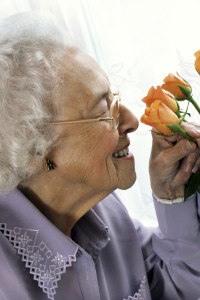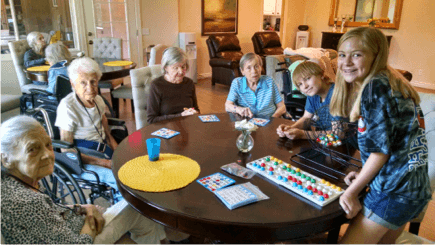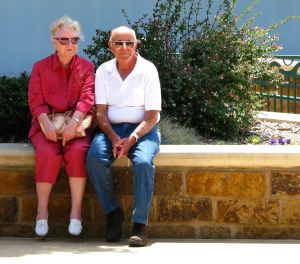5 Signs That Show It Is Time For An Assisted Living Center
 The process of deciding the best living situation for an elderly parent or loved one can be challenging. At a certain point, you may be forced to face the daunting decision of moving your family member from their own home into an assisted living center or group home. But how do you know when it is time for an assisted living center? What is the the right choice for your loved one? Read on to help guide you through the decision-making process and whether assisted living is now necessary for your senior:
The process of deciding the best living situation for an elderly parent or loved one can be challenging. At a certain point, you may be forced to face the daunting decision of moving your family member from their own home into an assisted living center or group home. But how do you know when it is time for an assisted living center? What is the the right choice for your loved one? Read on to help guide you through the decision-making process and whether assisted living is now necessary for your senior:
1. Their current home is not fit for their aging needs
Your senior may need an assisted living center if their current living situation isn’t providing a safe or easy environment for them to function. Some of the signs include:
- Mobility in and around the home is challenging; they may have difficulty with stairs or if they need to use a walker or wheel chair the hallways in an older home may not allow enough space for them to move.
- Upkeep of the home is costly; homes require maintenance and that can be expensive, especially on a fixed income.
- Location of the home is far from family; at a certain point it may be better for Mom or Dad to live closer to adult children or other family members.
- The home is larger than needed.
- The home appear dirty or unkept; cleaning can become difficult physically and mentally.
Many assisted living centers address these issues. It is common to see specially designed space that allows optimal mobility such as wider hallways and doorways and single stories. Services such as gardeners, chefs, and house cleaning are also often included or available when needed.
2. Your senior is showing signs of senility
It can be challenging, but it is important to look for signs that your loved one may be mentally declining to a point of becoming senile. Senility is not only disheartening, but can also lead to severe health risks. Following are signs to help you determine if senility is setting in:
- They spend days without leaving their home
- Your loved one is inactive in previous hobbies and activities
- Active friendships are diminishing
- Your senior refuses to spend time with family or friends
- They become more easily agitated or confused
If you are beginning to see these signs, it may be time to consider an assisted living center. At the very least, you should be checking in regularly to try and monitor behavior and encourage them to do and get out more. If these signs continue, then it may be time to begin looking at assisted living options. Assisted Living centers and group homes often provide activities that encourage socialization amongst residents. Caregivers will support and monitor residents throughout the day. This can help your senior stay engaged and senile tendencies.
3. Medical needs are escalating
As your loved ones age, their medical needs may also increase. If they remain at home, it can be challenging to provide the medical assistance needed. Some care requires travel or assistance that is difficult for a family member to administer.
If your senior’s medical needs are escalating, assisted living may be a good solution. Assisted living communities offer caregivers and/or skilled nurses or contract with home health agencies to assist with elderly medical needs. These services can provide the medical assistance in the comfort of the assisted living home and allow for the nurse/caregiver to become familiar with your senior’s changing needs.
4. Your senior’s overall appearance is declining
A decline in physical appearance can be caused by increasing challenges with mobility, health issues or cognitive difficulties. Sign of decline to look for or note include:
- Strange body odor
- Noticeable weight gain or weight loss
- Increase in frailty
- Refusal to change clothes or staying in same clothing for longer periods of time
- Appearing disheveled
- No longer practicing personal hygiene
Caregivers at assisted living homes can help with shower, dressing and other hygiene tasks that may be difficult for them to do on their own.
When family members are unable to help care for a senior, it can place a lot of strain on a family. Adult children face difficulty balancing the demands of home, work and children with caring for Mom and Dad, and spouses may be faced with their own health issues.
If you and other family members are feeling overwhelmed or simply cannot provide the care your senior needs, an assisted living center may be the best solution.
At Paradise Living Centers our caregivers are available 24/7 and provide personalized care and assistance to address the specific needs of our residents. If you would like to tour one of our assisted living group homes call (480) 878 – 4112.
 When you are trying to decide whether to
When you are trying to decide whether to  When touring
When touring  How can you tell if your elderly loved one may need assisted living care? This question can spark an overwhelming sense of confusion for all involved. However, it is an important question to consider. As we age, it is normal for mental and physical abilities to decline. Fortunately, assisted living homes provide an excellent option to give your loved one the care and support they may need.
How can you tell if your elderly loved one may need assisted living care? This question can spark an overwhelming sense of confusion for all involved. However, it is an important question to consider. As we age, it is normal for mental and physical abilities to decline. Fortunately, assisted living homes provide an excellent option to give your loved one the care and support they may need. We’ve seen it on the news and heard stories of it time and time again – scammers pretending to be someone else and taking thousands of dollars from the elderly. Many seniors may not be aware of the possible danger of scammers and can easily get caught in a web of deceit. This 87-year-old woman from Phoenix lost $17,000 when a criminal, who was pretending to be a police captain, convinced her to withdraw money from her bank account and give it to him.
We’ve seen it on the news and heard stories of it time and time again – scammers pretending to be someone else and taking thousands of dollars from the elderly. Many seniors may not be aware of the possible danger of scammers and can easily get caught in a web of deceit. This 87-year-old woman from Phoenix lost $17,000 when a criminal, who was pretending to be a police captain, convinced her to withdraw money from her bank account and give it to him.


